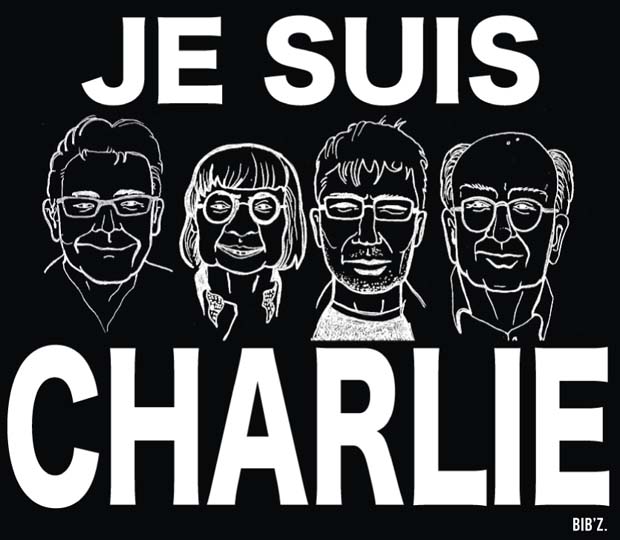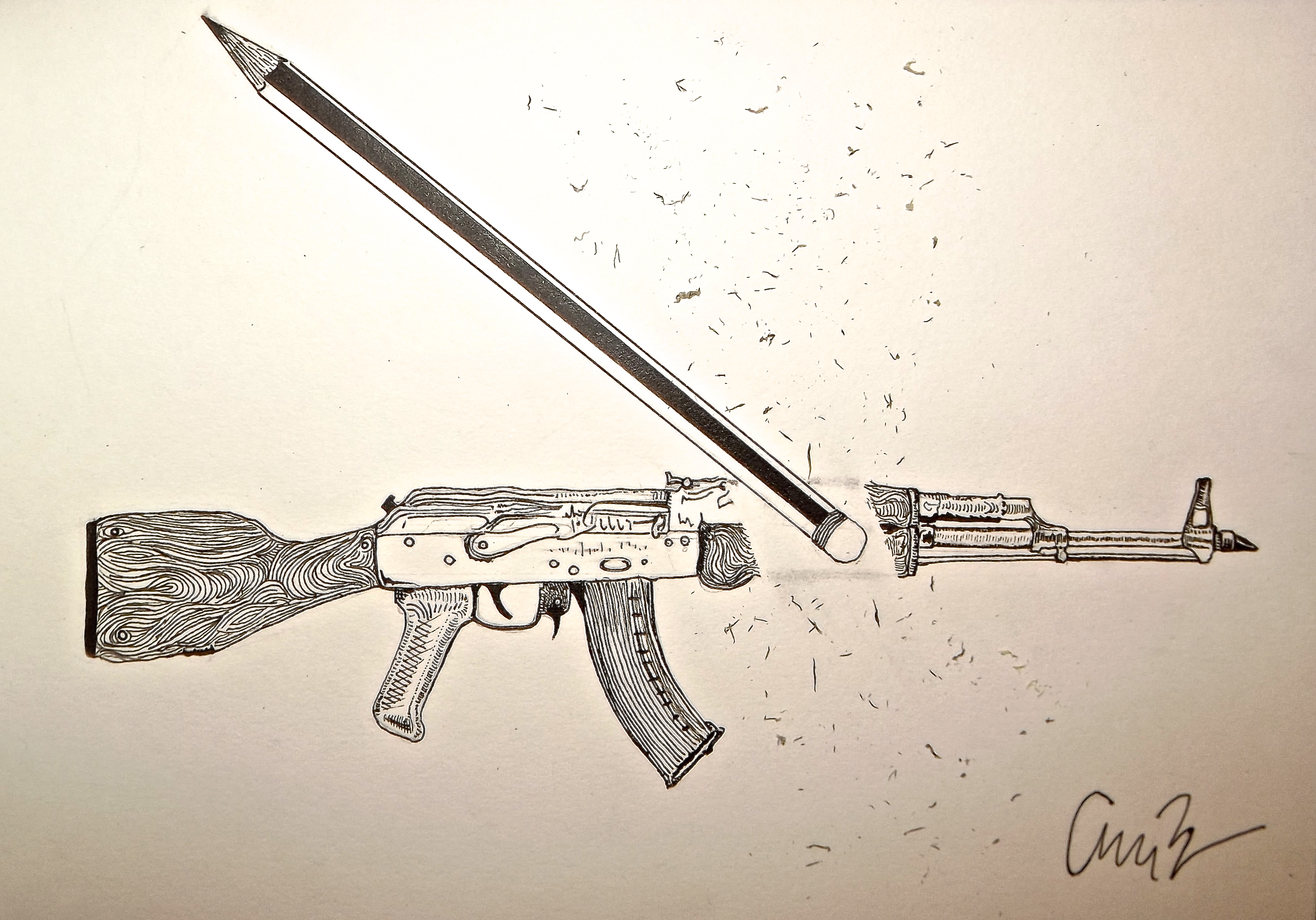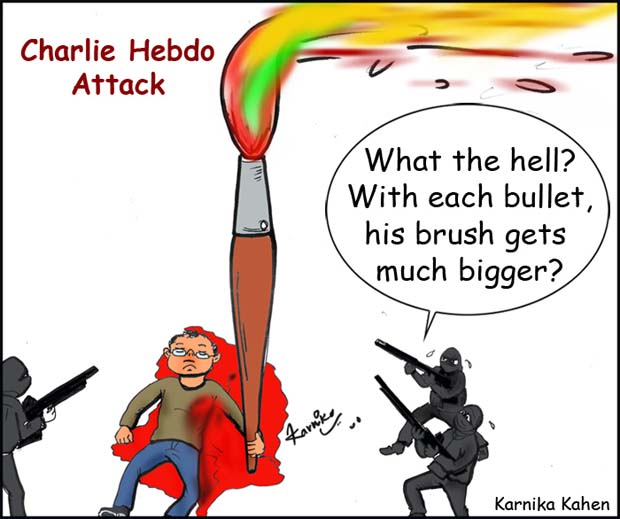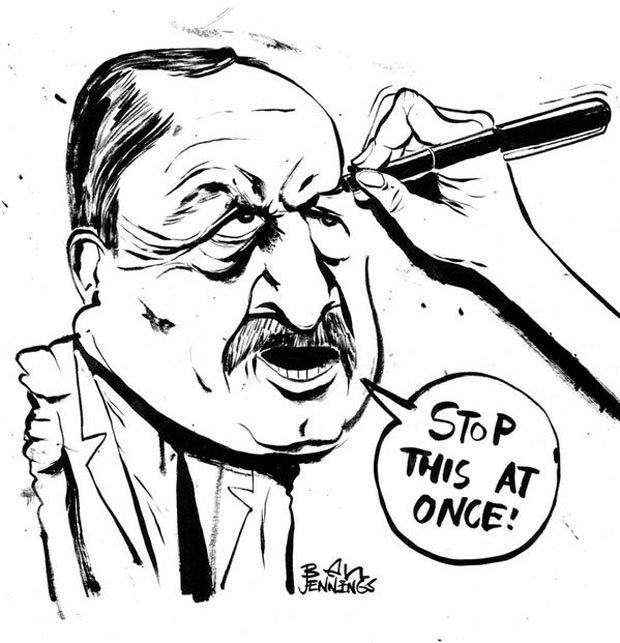How cartoonists responded to the attack on Charlie Hebdo

They Are Charlie: a tribute to cartoonists Bernard Verlhac aka Tignous, Jean Cabut aka Cabu, Stéphane Charbonnier aka Charb and Georges Wolinski by French artist Bib’z.
Armed men attacked the offices of French satirical magazine Charlie Hebdo on Wednesday. They killed two police officers and ten members of the magazine’s staff, including cartoonists Stéphane Charbonnier aka Charb, Jean Cabut aka Cabu, Georges Wolinski and Bernard Verlhac aka Tignous. The magazine has been targeted in the past over its controversial cartoons, including ones featuring the Prophet Mohammed. In 2011, the office was firebombed.
Index has condemned the appalling attack, saying there is nothing that could justify it. “The ability to express ourselves freely is fundamental to a free society. This includes the freedom to publish, to satirise, to joke, to criticise, even when that might cause offence to others. Those who wish to silence free speech must never be allowed to prevail,” added Index CEO Jodie Ginsberg.
Throughout the day, people from across the world have showed solidarity using the hashtag #JeSuisCharlie, while many cartoonists have supported the magazine through their art.
“Cartoonists are among the first people targeted by extremists and fundamentalists for poking fun at the sacred cows of our societies. Humour and satire are tools that close minded extremists have little defence against except by the use of weapons and murder,” Dr. Robert Russell, executive director of Cartoonists Rights Network International said in a statement.
“I feel very sad, horrified and hopeless after hearing this news,” Indian cartoonist Kanika Mishra, who drew the piece above, told Index. “One year ago, I was facing such threats when I made cartoons on [charismatic guru] godman Asaram but I never took those threats seriously. I never knew some blind followers and extremists can go to such extent. Whole world should be united against such horrific attacks on freedom of speech and its high time that we should start talking about a global policy for protecting the rights of every artist in the world.”
Martin Rowson, cartoonist for The Guardian, The Independent and Index among others, added that “we need above all else to laugh these blood-stained clowns back into the dustbin of history, and urgently.”
Below is a selection of the cartoons being shared on social media.
De tout coeur avec Charlie Hebdo. pic.twitter.com/8KwTipn3Wp
— PLANTU (@plantu) January 7, 2015
Charlie Hebdo. Nooit opzij. pic.twitter.com/MJwGKPQ8jU — Joep Bertrams (@joepbertrams) January 7, 2015
Horrible attack.Cartoonists across the world are uniting against bloodshed and violence. @ibnlive @cnnbrk pic.twitter.com/QtTe9INeU9
— Neelabh Banerjee (@NeelabhToons) January 7, 2015
The little weapon! #CharlieHebdo #cartoon pic.twitter.com/VFFZD2f8Rz — Satish Acharya (@satishacharya) January 7, 2015
Can’t sleep tonight, thoughts with my French cartooning colleagues, their families and loved ones #CharlieHebdo pic.twitter.com/LqIMRCHPgK
— David Pope (@davpope) January 7, 2015
Hommage de notre dessinateur @na_dessinateur aux victimes de #CharlieHebdo pic.twitter.com/2AgMZyc7Yq — BFMTV (@BFMTV) January 7, 2015
— El Jueves (@eljueves) January 7, 2015
Sad Khartoon! I’m Just a Muslim .. From a Muslim #Cartoonist RIP #CharlieHebdo pic.twitter.com/27Vt2RvAGs — ALBAIH (@khalidalbaih) January 7, 2015
Spanish cartoonists are sharing this image with the message: “To arms, companions!” via @sicevis #CharlieHebdo pic.twitter.com/hQqPJMQeV5
— Jennifer Hattam (@TheTurkishLife) January 7, 2015
Comment dessiner aujourd’hui ? Comment ne pas dessiner aujourd’hui ? pic.twitter.com/cNtJY6e7MK — Martin Vidberg (@Vidberg) January 7, 2015
Adieu Cabu, Wolinski, Tignous, Charb…le dessin de Zep. N’arrêtez jamais de dessiner. #CharlieHebdo pic.twitter.com/F9KInDR8AL
— Adeline Francois (@a2linefrancois) January 7, 2015
#CharlieHebdo pic.twitter.com/15O4YC2KWg — Ruben L. Oppenheimer (@RLOppenheimer) January 7, 2015
This article was published on 7 January and updated on 8 January 2015 at indexoncensorship.org



